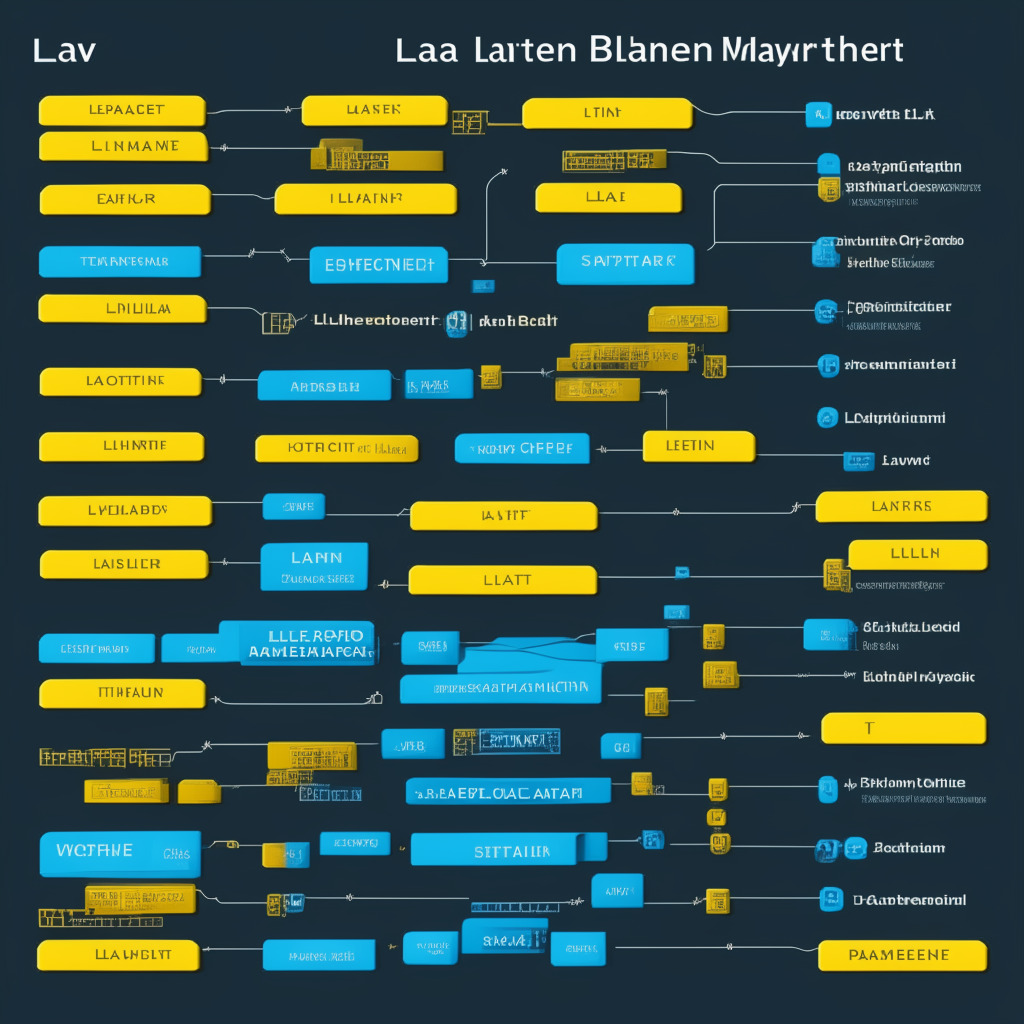“Farmville co-creator, Amitt Mahajan, backed by Proof of Play, has secured $33M to develop Web3 games, aiming to revolutionize the gaming sector with blockchain technology. The venture aims to facilitate smooth gameplay and promote decentralization but faces potential complexities and risks of emerging technology.”
Search Results for: Proof of Play
Leased Proof-of-Stake: Game-Changer or Just Another Player in Blockchain Technology?
“Blockchain technology introduces Leased Proof-of-Stake (LPoS), an innovative mechanism aimed at overcoming crypto mining complications. LPoS allows tokenholders to lease their tokens to validator nodes, improving their chance at generating new blocks and sharing transaction fees. While offering benefits such as decentralization and fixed tokens, LPoS also maintains control by restricting trade or transfer of leased tokens.”
Ethereum’s Bumpy Journey: From Proof-of-Work to Proof-of-Stake and Beyond
A pivotal upgrade known as the Merge transitioned Ethereum from a proof-of-work (PoW) consensus mechanism to a proof-of-stake (PoS), causing a net supply decrease of 299,922.50 ether. The PoS mechanism needs users to hold ether to validate transactions and earn rewards. This eliminated much miner supply and made Ethereum more eco-friendly. However, despite these changes, ether’s market values have stagnated.
Arbitrum’s Unused Fraud Proofs: A Testament to Security or Flawed Utilization?
“In the blockchain technology stakes, maintaining security and preventing fraudulent activity is key, with protocols like Arbitrum’s fraud proofs playing a significant role. Surprisingly, according to Offchain Labs, these fraud proofs haven’t been used since the protocol’s launch two years ago, due to a combination of strong deterrent measures and the risk to validators.”
Unraveling the Mystery of Zero-Knowledge Proofs: A Double-Edged Sword in Crypto Privacy
“Zero-knowledge proofs (ZK-proofs), cryptographic protocols that authenticate transactions without disclosing specifics or user identities, play a significant role in improving the privacy and scalability of cryptocurrency transactions. However, aspects like verifying protocol, potential security flaws and facilitating illegal activity present challenges to their wide adoption.”
Worldcoin’s Proof of Security Amid Biometric Criticism: A Necessary Evil or Orwellian Nightmare?
“Worldcoin, known for its proof of humanity protocol, faced criticism over data collection practices. Post security audits by Nethermind and Least Authority, 24 out of 26 identified issues were resolved. Unaddressed issues remain a concern despite progress in addressing challenges for this biometric security and blockchain blend.”
Vitalik Buterin Probes Worldcoin’s ‘Proof-of-Personhood’ Amid Conceptual Hurdles
Ethereum’s co-founder, Vitalik Buterin, has voiced his concerns about Sam Altman’s new crypto project, Worldcoin. Buterin scrutinized Worldcoin’s novel ‘Proof-of-Personhood’ system, expressing apprehensions on privacy, accessibility, centralization, and security issues related to iris scanning technology known as ‘World ID.’
Revolutionizing Crypto Exchanges: Unveiling the Interplay of AI and Cryptocurrency
Gracy Chen, the managing director of Bitget, highlights the company’s integration of AI in various areas including translations, customer service, and an AI-powered chatbot for efficient data access and trading strategies. Bitget also explores zero-knowledge proof (ZK-proof) technology for improved data protection and user fund custody, indicating the transformative potential of combining AI and cryptocurrency.
Navigating the Choppy Waters: Google Play’s Embrace of NFTs and Blockchain Technology
Google Play has revised their policy to accommodate developers integrating digital assets, such as non-fungible tokens (NFTs), into their apps and games. This move, prioritizing user-owned content, aims to foster user loyalty through exclusive NFT rewards, while ensuring responsible use of blockchain technology.
Shibarium Launch by Shiba Inu Dev Team: A Blockchain Revolution or a Power Play?
“Shibarium, a project led by the Shiba Inu development team, is anticipated to go live next month. The launch aligns with Shiba Inu’s third-year anniversary. Shibarium’s capabilities will be exhibited at the Blockchain Futurist Conference, also sponsored by Shiba Inu’s ecosystem.”
Sui Blockchain: A Fast-Growing Contender or Just Another Whales’ Playground?
Sui, a Layer 1 blockchain, brings high-speed transactions, instant processing, and scalability to the crypto space. Its native programming language, Move, simplifies smart contract development for DeFi. Despite potential benefits, concerns arise over long-term sustainability, transaction costs, and wealth distribution among participants.
Green Proofs for Bitcoin: Incentivizing Sustainable Mining Practices and Balancing Criticism
Green Proofs for Bitcoin, launched by Energy Web, aims to incentivize sustainable practices in the bitcoin mining industry. By offering transparency into companies’ decarbonization initiatives, it bridges the gap between sustainable miners and potential investors, encouraging a more environmentally friendly future.
Exploring Blockchain’s Booming Growth: Exciting Innovation or Dangerous Playground?
This article explores the potential benefits and drawbacks of the rapidly growing cryptocurrency and blockchain industry, including innovative projects, decentralized finance (DeFi) evolution, and concerns regarding scams, fraudulent activities, and regulatory challenges. Additionally, it addresses the environmental impact debate surrounding blockchain-based technologies like Bitcoin’s Proof-of-Work consensus mechanism.
Balancing Act: Choosing the Right Consensus Mechanism for Your Blockchain Project
“Choosing a consensus mechanism for a blockchain project is complex and multifaceted, involving the balancing of security, sustainability, scalability, regional preferences, and long-term project goals. The decision requires understanding and navigating through various project-specific details and an ever-evolving technology landscape.”
Scorching Success of Scorpion Casino: Gambling Prospects in Web3 Era and Market Limits
“The expanding popularity of online gambling, particularly within the Web3 sphere, is seeing blockchain projects like Scorpion Casino gain traction. The immutability of blockchain technology offers transparency and fairness not seen in traditional gambling. Scorpion Casino, a versatile platform offering comprehensive betting opportunities, augments price growth stability with deflationary tokenomics, setting it up for a 10X value appreciation in 2023.”
Canadian Securities Administrators Unveil Interim Framework for Stablecoin Issuers: Ensuring Safety or Stifling Creativity?
“The Canadian Securities Administrators (CSA) has unveiled a framework to guide exchanges and issuers of stablecoins, aiming to enhance transparency and trust. The rules require stablecoin issuers to maintain sufficient reserves with a qualified custodian and disclose crucial platform information, underscoring the need for investor information and protection.”
Unveiling the Stealthy Wave of AI in Crypto Trading: In the Footsteps of Electric Vehicle Shift?
AI is set to bring significant changes to the financial space, much like the electric vehicle trend did to the automotive industry. AI Crypto projects such as yPredict are spearheading this change in traditional finance setups with versatile tools for traders. The company offers a comprehensive solution with capabilities extending beyond just trading signals and price predictions. Despite the competitive market, yPredict’s innovative approach to AI crypto trading offers both opportunity and risk, making it a crucial player to watch in the evolving financial landscape.
Wirex’s W-Pay: Future DeFi Gamechanger or Just Another Crypto Wild Card?
Wirex’s new service, W-Pay, introduces a non-custodial crypto debit card service leveraging Zero-Knowledge (ZK) proofs-based technology. This service offers a new way of interacting with cryptocurrencies daily, promising swift, secure transactions, and sole control over funds. However, ongoing challenges with partnership dependencies may pose questions about the technology’s reliability.
Navigating Change: The Dynamic Shifts in Polygon’s Leadership and Impact on Blockchain Future
“Polygon, a renowned Ethereum layer 2 scaling solution, is entering a new phase of development, marked by significant shifts in its leadership. Co-founder Jaynti Kanani steps back, while Marc Boiron becomes CEO, in sync with Polygon’s transition to Polygon 2.0, which bring substantial technological innovations in blockchain systems.”
Assessing the Impact of AI and Blockchain Export Controls: Opportunities and Threats for the Crypto World
The European Commission is assessing export controls on AI and semiconductor technologies due to their potential risk, technologically and for human rights violations. Four focal areas for risk assessment are AI, advanced semiconductors, quantum technologies and biotechnologies, influenced by their transformative nature and potential for civil/military fusion.
Unleashing AI and Blockchain’s Potential in Gaming: New Dimensions or Risky Bet?
“Ryan Wyatt, former gaming head at Google and YouTube, outlines AI’s role in the gaming industry. While not a replacement for tasks, AI will aid game teams to accomplish more. Wyatt sees blockchain’s potential in game development and its necessity in holding accountability over AI advancement due to its transparent, reliable nature.”
Unveiling the Future of Crypto Markets with yPredict’s AI-powered Ecosystem: A Guide
“yPredict’s ecosystem offers distinctive features like AI-generated trading signals, technical and quantitative analysis, and sentiment analysis on cryptocurrencies. With AI-driven solutions aiding backlink strategies for content creators and predictive models forecasting crypto prices, its platform promises a cutting-edge future for blockchain and AI.”
Scaling the Regulatory Walls: Challenges and Solutions for Digital Asset Markets
The World Federation of Exchanges (WFE) proposed six measures to ensure the safety and sustainability of digital asset markets. These include clear segregation of market infrastructure functions and establishing systems to manage user risks. The WFE also emphasized the need for crypto exchanges to demonstrate full backing of user assets and be sufficiently regulated.
Unmasking the Surge: Dissecting TRB’s Rise and BTCBSC’s Promising Debut
“The Oracle project, TRB has seen a surge of 37%, drawing crypto community attention. Oracles like TRB connect live external data to smart contracts and blockchains. Amid speculation, BTCBSC, a Bitcoin derivative, has raised over $5.8 million, promising faster transactions and incentivized staking, while warning of market volatility.”
Bitcoin Ordinals, the Invisible Friend or Foe? Unraveling their Impact on Network Congestion and Market Dynamics
“Ordinals, a method of registering digital content on the Bitcoin network, are seen as disruptive by some. However, analytics firm Glassnode finds little proof that they’re causing network congestion. Despite concerns, these bitcoin ‘pocket fillers’ seem to coexist with other money transfers, leveraging cheap block space without greatly impacting transfer volumes.”
Balancing Act: SEC Rules on Crypto and Its Implications on Innovation and Governance
“The U.S. Securities and Exchange Commission (SEC) focuses its powers on the crypto market, signaling the need for check and balances. SEC proposes rules for firms to analyze conflicts of interest while interacting with investors and levels the field between tech advancements and governance. The regulation and compliance could substantially impact the future of crypto world.”
Decoding the Vaults: Immunefi’s On-Chain Bug Bounty System and Its Possible Pitfalls
Immunefi, a blockchain security platform, has launched its on-chain system for bug bounties named “Vaults”. The system incentivizes white hat hackers by showcasing funds reserved for bounty payments, intending to receive quality bug reports. Despite the potential for slowing processes and unveiling security risks, benefits include enhanced trust-building and streamlined payments.
Overcoming MetaMask’s Gas Fee Glitch and Blockchain’s Role in Verifying the Next Moon Landing
A glitch that overcharged MetaMask users on opBNB gas fees has been rectified. Originally, MetaMask’s default fee, calculated on an average of networks, failed to align with opBNB. To address this, MetaMask altered their algorithm to accurately display the network’s fees.
Navigating Bitcoin’s Storm: Prepare for Short-Term Slump before 2024 Bull Run
The Q3 2023 saw Bitcoin (BTC) lose nearly 15%, mainly due to rising US bond yields and a strong dollar. The Federal Reserve’s potential interest rate hike is making volatile assets like Bitcoin less attractive. However, with growing institutional acceptance and possible Bitcoin ETF approvals, macroeconomic changes could propel future BTC bull markets – potentially initiating in 2024.
Crypto Game Changer: Dissecting Bitcoin BSC’s Breakout Presale and Substantial Growth Potential
All eyes are on Bitcoin BSC this September as its presale surpasses the $4m mark. Its staking properties have great appeal to investors aiming for long-term holder rewards. But as the soft cap nears, early investors’ chances for big returns could disappear. Bitcoin BSC’s unique staking mechanism offers potential for substantial growth while its energy-efficient design stands as a compelling alternative to Bitcoin’s model.
Co-founder Conflict Slashes GALA Value & Bitcoin BSC Emerges as Compelling Alternative
The saga of the GALA token includes claims of illicit procurement and misappropriation affecting its price. Amidst this, emerging market sector Bitcoin BSC offers speed, low fees, and reduced environmental footprint. With a staking-based investment strategy promising 8-10% APY and stable pricing, it represents innovation and opportunity in a volatile crypto landscape.
Decentralized Finance (DeFi): Embracing Breakthrough or Hastening Regulatory Recklessness?
“In a significant endorsement of decentralized finance (DeFi), Coinbase’s CEO, Brian Armstrong, promotes the need for conducive regulation, facilitating DeFi development rather than punitive enforcement. His stand reflects DeFi’s growing recognition within mainstream finance, but also stresses on avoiding over-regulation that could stifle technological advancement.”































